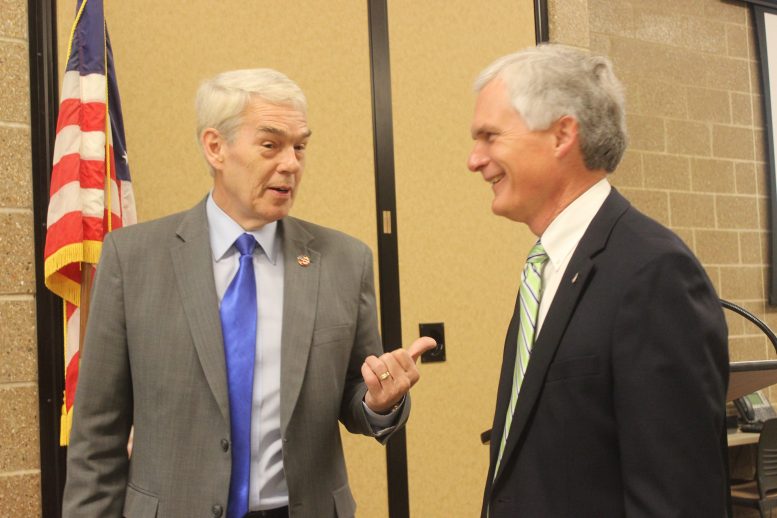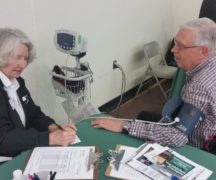By DAVID DUPONT
BG Independent News
Ohio State Rep. Haraz Ghanbari isn’t saying yet how he’ll vote on House Bill 6.
The bill, which has been moved to the House for action after passing through the committee on which Ghanbari sits, would provide subsidies for nuclear and coal power. And because of action taken in committee, subsidies for “green” power — hydroelectric, solar, and wind — would be axed.
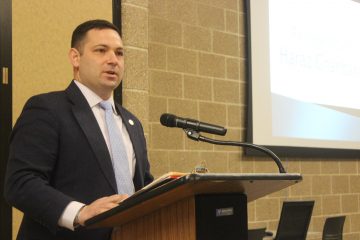
Speaking at the Bowling Green Chamber of Commerce’s legislative update Friday morning, Ghanbari said he still needed to have some conversations before casting his vote. Those would include talks on Wednesday with Bowling Green city officials.
The bill as now written is not good news for Bowling Green. Mayor Dick Edwards told Ghanbari that the bill would cost the city, which prides itself on its wind turbines and solar fields, $400,000.
Though the state representative said he looked forward to talking with city officials, his comments focused on the importance of nuclear power to the state.
Nuclear, gas, and coal provide most of the electricity for the state. Solar, wind, and hydro could potentially provide more in the future, but not now.
He said while he is concerned about his district he also has to be concerned about the rest of the state, and the employment that come from nuclear power and the manufacturers who depend on it.
Ghanbari was one of a panel speaking at the update. He was joined by Randy Gardner, former legislator from the county and now the state’s chancellor of higher education; U.S. Rep. Bob Latta; and Ohio State Senator Theresa Gavarone, who was appointed Senate Republicans earlier this year to fill Gardner’s term when he was appointed chancellor.
Ghanbari was appointed by the House Republicans to complete Gavarone’s term in the House.
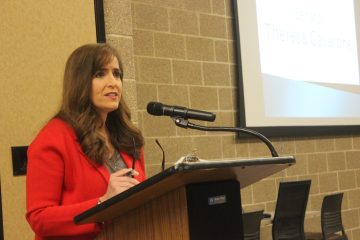
Gavarone and Ghanbari are both working on legislation to fund the H2Ohio Fund.
Gavarone, who credited Gardner for spearheading the legislation when he was in the Senate, said the funding was in Gov. Mike DeWine’s budget but was removed.
Now she’s hoping the state can have a bond initiative to help preserve Lake Erie, which she called “a tremendous asset.”
Ghanbari said the house was looking at a 100-year investment, starting with an endowment board and an investment of as much as $500 million. This investment could generate $20 million a year for projects.
A focus of the legislation is accountability making sure the money is spent on the right projects and right research.
Ghanbari has recently been appointed as the Ohio House’s representative to the Great Lakes Commission Compact, where he joins representatives from seven states and the Canadian provinces of Ontario and Quebec.
The state’s opioid crisis was brought up by both Latta and Gavarone.
Latta noted that last year a sweeping bill to address the opioid crisis was passed and signed by President Trump.
Now, he said, he’s talking to constituents to see how well it is working and whether more needs to be done.
Gavarone is sponsoring a bill to toughen the penalties on drug traffickers who peddle their drugs near treatment centers. She said that she’s heard of people selling drugs at recovery group meetings.
The idea for the bill came through her conversations with Wood County Prosecutor Paul Dobson.
Both Latta and Gavarone left for other appointments after they made their presentations and did not stay to take questions.
Latta also addressed:
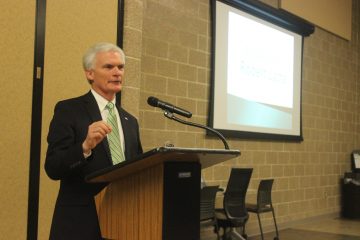
- Robocalls. No one is immune, he said — even members of Congress during a hearing on robocalls. There are now 50 million such calls placed, most originating in India. He said the key is to have a program where customers are automatically enrolled in a do-not-call type program, instead of having to opt-in.
- Net neutrality. The bill passed by House Democrats is dead because it cannot get support in the GOP controlled Senate. House Republicans are looking for a more balanced approach.
- Self-driving car technology. At this point the technology is at “2” on a scale to five in development. National standards are essential or else drivers may find they can’t use some technology when they cross state lines. Self-driving vehicles, he said, promise to improve safety. They also could make driving a possibility for the elderly and people with disabilities, who at this point cannot drive.
Gavarone also addressed:
- School bus safety. Proposed legislation would stiffen the penalties, including license suspension, on those who illegally pass school buses. Bus drivers have told her this happens daily. It would also establish August as Bus Safety Awareness Month.
- Cyber security. Gavarone is supporting legislation to create a cyber security reserve team of trained volunteers who have already gone through background checks and are ready to spring into action in the case of a cyber attack on a corporation or government entity. The bill would also require audits of election results.
Randy Gardner said he was relieved that now he only had to answer questions about higher education.
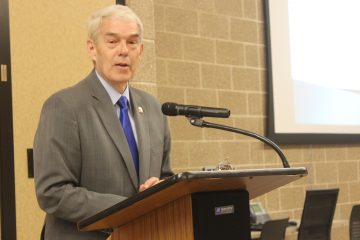
He said that the governor’s proposed state budget has a 50-percent increase in the amount of money for need-based scholarships. That redresses a problem that has dogged the state for the past decade.
He expressed hope that maybe the Senate, working with the House, would do even more.
Gardner said that Ohio has restrained the growth in tuition more than any other state. State tuition is now 105 percent of the national average. “Higher than it needs to be,” but better than the 150 percent it was 12 years ago. “We’re almost to the national average,” he said.
“This budget provides some affordability measures that make us more competitive with other states in higher ed.”
Also helping is the tuition guarantee program through which students pay the same tuition for four or five years, depending on the program. The program, which has been adopted by Bowling Green State University, is now entering its second year.
Gardner also said the state has “to find ways to engage the incumbent workforce in upscaling, retraining, workforce development programs.”
Gov. Mike DeWine’s proposed budget “does that in a significant way.”
There needs to be, he said, “much better alignment with private sector and state government and higher education” to train residents in the skills that are in demand.

